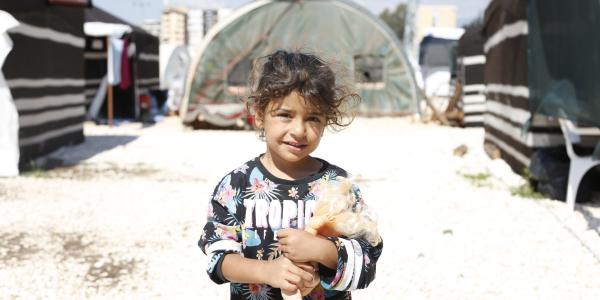100 DAYS AFTER EARTHQUAKES HIT TÜRKIYE AND SYRIA, MILLIONS OF CHILDREN CONTINUE TO FACE DESPERATE CONDITIONS
Patrick D Costa
Millions of children and families are struggling to rebuild their lives one hundred days after the deadliest earthquakes in Turkey’s and Syria’s recent history. In Turkey, 2.5 million children and 3.7 million in Syria require ongoing humanitarian assistance.
The two starting crushing quakes on 6 February 2023, trailed by large number of consequential convulsions, have driven numerous families to the edge and left youngsters destitute and without admittance to fundamental administrations, including safe water, instruction and clinical consideration, and expanded assurance gambles for weak kids.
When UNICEF Executive Director Catherine Russell visited both countries just a few weeks after the initial earthquakes, she stated, “In the aftermath of the earthquakes, children in both countries have experienced unimaginable loss and grief.” Numerous families were already extremely at risk when the earthquakes struck. Children’s lives have been turned upside down by the deaths of loved ones and family members, as well as by the destruction of their homes, schools, and communities.
Prior to the most recent earthquakes, many affected families were struggling. With approximately 40% of households living below the poverty line in the regions of Türkiye, compared to 32% nationwide, rates of child poverty were already high. This number could rise to more than 50%, according to estimates, if ongoing support from both the local community and the international community isn’t provided, such as funding for education and cash transfers.
As of now, weak youngsters in hard-hit regions are presented to dangers including savagery, constrained marriage or work, and exiting school. Nearly four million school-aged children, including more than 350,000 children from migrant and refugee backgrounds, experienced disruptions to their education. While Türkiye has gained ground in lessening these dangers as of late, the effect of the quakes could slow down that work.
After 12 years of continuous conflict in Syria, which has affected all infrastructure and public services, children were already struggling. This was made worse by the massive earthquakes in February, which further damaged schools, healthcare facilities, and other essential infrastructure. The serious harm to water and sewage foundation has put 6.5 million individuals at a raised gamble of waterborne sicknesses, including cholera.
An expected 51,000 kids younger than five are probably going to experience the ill effects of moderate and extreme intense ailing health and 76,000 pregnant and breastfeeding ladies need therapy for intense hunger.
Many schools are still being used as shelters, disrupting the education of an estimated 1.9 million children. Over the past 100 days, a significant number of them are as yet living in extraordinarily tough spots, with stress elevated by the extra vulnerability of not knowing when they need to move starting with one safe house then onto the next.
Russell stated, “Families will require our continued support. The road to recovery is a long one.” Hundreds of thousands of children will be further pushed into poverty as a result of the disaster’s long-term effects, which include an increase in the cost of food and energy as well as the loss of access to services and sources of income. Children will continue to be at greater risk of exploitation and abuse unless essential services and financial assistance are prioritized for these children and their families as part of the immediate and long-term recovery plan.
UNICEF approaches the worldwide local area to focus on a youngster zeroed in early recuperation and guarantee that kids’ requirements are met inside financing designations. Speculations should be put forth in recuperation attempts, with an accentuation on working back better, stronger, and more comprehensive frameworks for the most minimized.
Since the earthquakes, UNICEF has been tirelessly assessing the effects of the disaster, assisting in the rehabilitation of damaged infrastructure, restoring basic services, and scaling up immediate lifesaving assistance to affected communities. Nonetheless, more help is expected to address the continuous emergency.
UNICEF urges continued investment in crucial areas, such as financial assistance for families, access to high-quality education, and psychosocial support, in order to safeguard children’s rights and prevent further deprivation. These investments will assist in lifting families out of poverty and preventing undesirable outcomes like child labor and marriage between children.
Kept financing for wellbeing, sustenance and water, disinfection and cleanliness programs is basic in guaranteeing kids’ wellbeing and prosperity and decreasing the dangers of illness episodes.
UNICEF is asking for US$172.7 million to implement its Immediate Response Plan for the Earthquake in order to meet the lifesaving needs of nearly 3 million children in Syria who have been affected by the earthquake. There has been a total of $78.1 million received, but nutrition, health, and education continue to receive significantly insufficient funding.
In order to provide the necessary services to the children who are in need, UNICEF still needs more than US$85.4 million from a US$196 million appeal. The humanitarian cash transfer intervention is severely underfunded, despite the fact that all sectors have needs.





